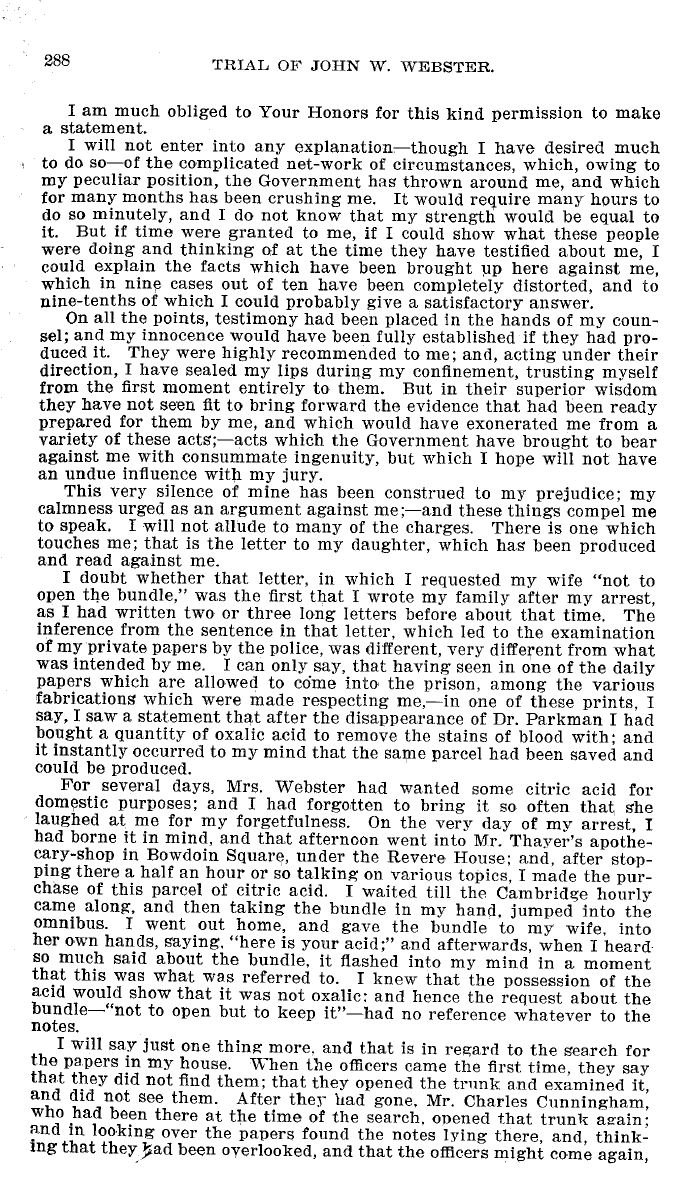|
288 TRIAL OF JOHN W. WEBSTER.
I am much obliged to Your Honors for this kind permission to make
a statement.
I will not enter into any explanation-though I have desired much
to do so-of the complicated net-work of circumstances, which, owing to
my peculiar position, the Government has thrown around me, and which
for many months has been crushing me. It would require many hours to
do so minutely, and I do not know that my strength would be equal to
it. But if time were granted to me, if I could show what these people
were doing and thinking of at the time they have testified about me, I
could explain the facts which have been brought up here against me,
which in nine cases out of ten have been completely distorted, and to
nine-tenths of which I could probably give a satisfactory answer.
On all the points, testimony had been placed in the hands of my coun-
sel; and my innocence would have been fully established if they had pro-
duced it. They were highly recommended to me; and, acting under their
direction, I have sealed my lips during my confinement, trusting myself
from the first moment entirely to them. But in their superior wisdom
they have not seen fit to bring forward the evidence that had been ready
prepared for them by me, and which would have exonerated me from a
variety of these acts; acts which the Government have brought to bear
against me with consummate ingenuity, but which I hope will not have
an undue influence with my jury.
This very silence of mine has been construed to my prejudice; my
calmness urged as an argument against me; and these things compel me
to speak. I will not allude to many of the charges. There is one which
touches me; that is the letter to my daughter, which has been produced
and read against me.
I doubt whether that letter, in which I requested my wife "not to
open the bundle," was the first that I wrote my family after my arrest,
as I had written two or three long letters before about that time. The
inference from the sentence in that letter, which led to the examination
of my private papers by the police, was different, very different from what
was intended by me. I can only say, that having seen in one of the daily
papers which are allowed to come into the prison, among the various
fabrications which were made respecting me,-in one of these prints, I
say, I saw a statement that after the disappearance of Dr. Parkman I had
bought a quantity of oxalic acid to remove the stains of blood with; and
it instantly occurred to my mind that the same parcel had been saved and
could be produced.
For several days, Mrs. Webster had wanted some citric acid for
domestic purposes; and I had forgotten to bring it so often that she
laughed at me for my forgetfulness. On the very day of my arrest, I
had borne it in mind, and that afternoon went into Mr. Thayer's apothe-
cary-shop in Bowdoin Square, under the Revere House; and, after stop-
ping there a half an hour or so talking on various topics, I made the pur-
chase of this parcel of citric acid. I waited till the Cambridge hourly
came along and then taking the bundle in my hand, jumped into the
omnibus. I went out home, and gave the bundle to my wife, into
her own hands, saying, "here is your acid;" and afterwards, when I heard
so much said about the bundle, it flashed into my mind in a moment
that this was what was referred to. I knew that the possession of the
acid would show that it was not oxalic: and hence the request about the
bundle-"not to open but to keep it"-had no reference whatever to the
notes.
I will say just one thing more. and that is in regard to the search for
the papers in my house. When the officers came the first time, they say
that they did not find them that they opened the trunk and examined it,
and did not see them. After they- had gone, Mr. Charles Cunningham,
who had been there at the time of the search, opened that trunk atrain;
and in looking over the papers found the notes lying there, and, think-
ing that they 3,ad been overlooked, and that the officers might come again,
|

